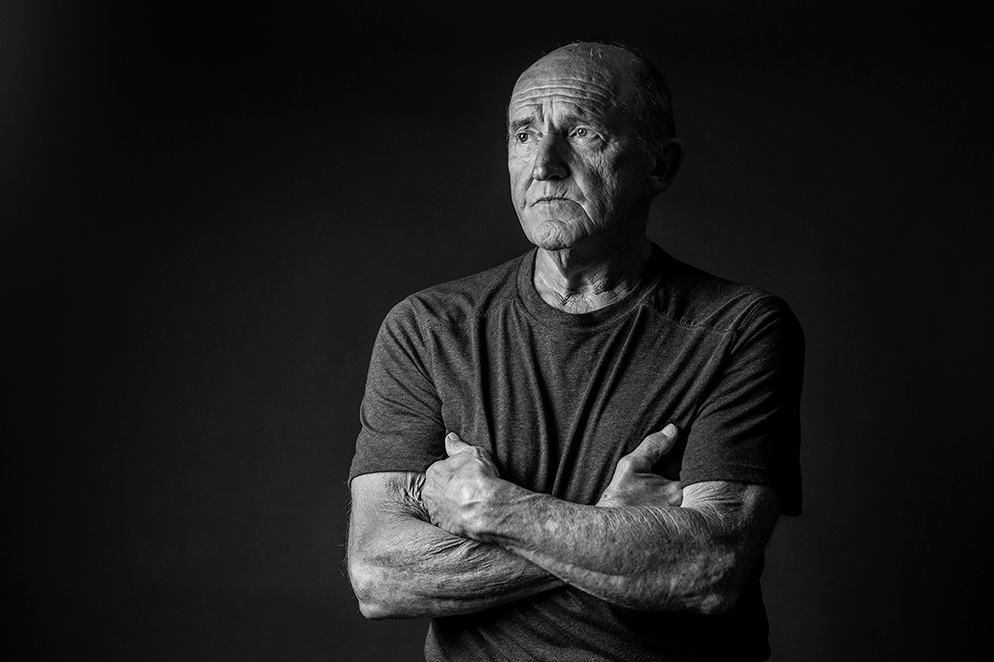For veterans of the Vietnam War, sharing their stories more than 50 years after the fight hasn't come easily, or even at all. Talk of Vietnam became personal for Journalism graduate student Tara Mesyn after her father-in-law briefly opened up to her about his experience.
“I have always been fascinated with history, and my two uncles and my father-in-law are Vietnam veterans,” said Mesyn. “My one uncle and my father-in-law were both drafted, and I had another uncle who enlisted. I didn’t know he enlisted until after he passed away, which was kind of shocking. That’s how little they talked about it.”
Inspired, Mesyn combined her personal connection with her photojournalism skills to create an oral history and portraits project that honored veterans’ stories of Vietnam. She recently shared her research at VisCom, a conference where academics and creatives can present their work to others in the visual communications field.
American Hurt
Mesyn’s project, titled “American Hurt: Vietnam Veteran Portraits & Perspectives,” is a website composed of images of Vietnam veterans alongside audio of them talking about their experiences during and after the war. The simple but powerful black and white photos beautifully capture the spirit of the men Mesyn interviewed.

“I think when we see a good photo, whether it’s a breaking news photo or a portrait, it can stop us in our tracks,” said Mesyn. “What’s kind of difficult with this is making sure I’m capturing that emotion and capturing who [these veterans] are. Pairing that with the audio of them telling these stories will hopefully make people want to stop and listen.”
Through word of mouth, Mesyn’s interviews have expanded beyond her family. To date, she has spoken with and documented the stories of six veterans. All the information she receives is offered voluntarily, and she makes a point to never press for more than the veterans are comfortable sharing. Before interviews, Mesyn uses questionnaires to research each individual’s experience, such as where they were stationed in Vietnam and what their job was while they were there.
“What’s exciting is that every veteran so far has said that they’ve told me more than they’ve ever told anybody, even sometimes their veteran buddies,” Mesyn said. “Some of it’s funny and light-hearted, but some of it’s heavy. There’s a big responsibility there to make sure I’m representing what they want the world to know in a respectful way.”
A Complicated History
Mesyn’s plan is to extend “American Hurt” into her Information and Media Ph.D. dissertation to include perspectives from other groups involved in the conflict, as well as additional historical and political research. She acknowledged that Vietnam has a complex, intertwined political history. By adding other voices to the project, she hopes to include a greater depth to the current materials.
“There’s a lot there, and I think there’s so much people probably don’t know about that era,” Mesyn said. “This is the [American veterans’] side of the story, which maybe hasn’t been told as often as it should have been, but there were also protesters and draft dodgers, and—fingers crossed—I might have a link to photojournalists who shot in Vietnam.”
For Mesyn, one of the biggest takeaways from speaking with veterans has been the impact Vietnam had on their lives as young men serving in a controversial conflict, and the impact it continued to have after they returned.
“I hope that people will go to the website when it's done and look at the images as they hear the veterans’ words, take in what they’re saying and remember when they were 18,” said Mesyn. “Imagine the things they had to do, and then they had to come home to an environment where it wasn’t a popular war. Sometimes they were doing things they didn’t want to do, but it was their job and they had to do it. I hope people learn from [my project] about how we treat people, and how we need to learn from history so we don’t repeat our mistakes.”
What’s Next
There has been some trial and error for Mesyn, but she’s thrilled with how the project has evolved along the way. The website is under development, and she is still conducting interviews. Mesyn is optimistic about where the project could lead.
“I would love to see [the project] in a gallery of some sort, maybe at Art Prize next year,” said Mesyn, referring to the annual Grand Rapids event. “In my experience as a former high school teacher, students hate history textbooks, and there’s maybe a subchapter on Vietnam. So I’d also like to take a project like this and turn it into a live text that can be used in the classroom. I like to be open minded—you never know where something might take you.”
By Kristina Pierson
